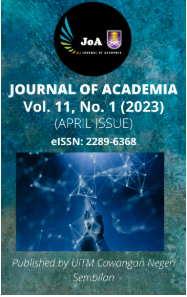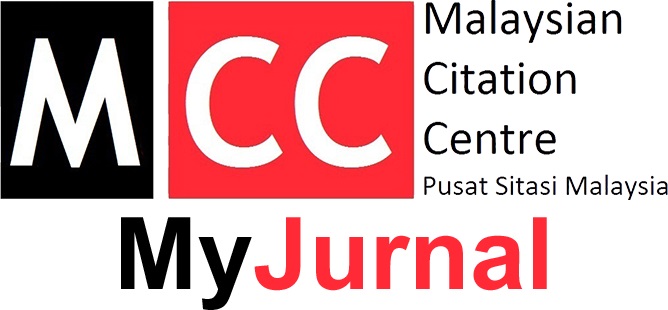THE PERCEPTION OF EMPLOYEES ON WHISTLEBLOWING EFFECTIVENESS: EVIDENCE FROM TELECOMMUNICATION PUBLIC LISTED COMPANIES IN MALAYSIA
Keywords:
Whistleblowing, organizational support, telecommunication, policies, perceived protectionsAbstract
Most of the time, fraud and misconduct are found unintentionally, and the whistleblower's role is crucial in preventing fraud and corporate misconduct. Whistleblowing exposes an organization's wrongdoing to make it right, not to harm it. Understanding the critical role played by whistleblowers, it is vital to understand the employees’ perceptions of the effectiveness of whistleblowing. This study examines employees’ perception of whistleblowing effectiveness in telecommunication public listed companies (PLCs) in Malaysia. Previous studies found that organizational support, knowledge of whistleblowing policies, and perceived protections against retaliation affect the perception of employees on whistleblowing globally. This study used a quantitative approach via primary data from close-ended questionnaires. In addition, this study investigated the telecommunication sector in Malaysia. Correlation analysis found a significant moderate positive correlation between the perception of employees on whistleblowing effectiveness in telecommunication public listed companies (PLCs) with organizational support and knowledge of whistleblowing policies; however, there is a significantly low negative correlation with perceived protection against retaliation. Whereas, standard multiple linear regression analysis found that 40.8% variation of the perception of employees on whistleblowing effectiveness in telecommunication public listed companies (PLCs) is explained by the interpretation of three independent variables (organizational support, knowledge of whistleblowing policies, and lastly, perceived protection against retaliation) which means another 59.2% is explained about other things other than three independent variables that have been tested in this study. Given the study’s analytical perspectives and realistic recommendations, some drawbacks to this study could be enhanced for future research. Key concerns may be linked to its context, which is restricted to employees employed in telecommunication public listed companies registered under the Main Market of Bursa Malaysia. Future researchers could select employees working in other factors, such as the manufacturing, banking, and automotive industries, when selecting the sample size.
References
Alleyne, P., Charles-Soverall, W., Broome, T., & Pierce, A. (2017). Perceptions, predictors, and consequences of whistleblowing among accounting employees in Barbados. Meditari Accountancy Research, 25(2), 241–267.
Alpkan, L., Karabay, M., Şener, İ., Elçi, M., & Yıldız, B. (2021). The mediating role of trust in leader in the relations of ethical leadership and distributive justice on internal whistleblowing: a study on Turkish banking sector. Kybernetes, 50(7), 2073-2092.
Banerjee, S., & Roy, S. (2014). Examining the dynamics of whistleblowing: A causal approach. IUP Journal of Corporate Governance, 13(2), 7.
Berry, B. (2004). Organizational culture: A framework and strategies for facilitating employee whistleblowing. Employee Responsibilities and Rights Journal, 16, 1–11.
Bjørkelo, B., Ryberg, W., Matthiesen, S. B., & Einarsen, S. (2008). When you talk and talk and nobody listens”: A mixed method case study of whistleblowing and its consequences. International Journal of Organisational Behaviour, 13(2), 18-40.
Bouville, M. (2008). Whistleblowing and morality. Journal of business ethics, 81, 579-585.
Campbell, G. (2012). Snitch or Savior: How the Modern Cultural Acceptance of Pharmaceutical Company Employee External Whistleblowing is Reflected in Dodd-Frank and the Affordable Care Act. U. Pa. J. Bus. L., 15, 565.
Chang, Y., Wilding, M., & Shin, M. C. (2017). Determinants of whistleblowing intention: evidence from the South Korean government. Public Performance & Management Review, 40(4), 676–700.
Chiu, R.K. Ethical Judgment and Whistleblowing Intention: Examining the Moderating Role of Locus of Control. Journal of Business Ethics 43, 65–74 (2003). https://doi.org/10.1023/A:1022911215204
Cho, Y. J., & Song, H. J. (2015). Determinants of whistleblowing within government agencies. Public Personnel Management, 44(4), 450-472.
Duska, R., Duska, B. S., & Ragatz, J. A. (2011). Accounting ethics. 2nd Ed. West Sussex: Wiley-Blackwell Publishing.
Gundlach, M. J., Douglas, S. C., & Martinko, M. J. (2003). The decision to blow the whistle: A social information processing framework. Academy of Management Review, 28(1), 107-123.
Henik, E. (2015). Understanding whistle-blowing: A set-theoretic approach. Journal of Business Research, 68(2), 442–450.
Hersh, M. A. (2002). Whistleblowers—heroes or traitors?: Individual and collective responsibility for ethical behaviour. Annual Reviews in Control, 26(2), 243–262.
Hoffman, W. M., & McNulty, R. E. (2017). A Business Ethics Theory of Whistleblowing Responding to the $1 Trillion Question. In Whistleblowing (pp. 45–60). Routledge.
Jackson, D., & Raftos, M. (1997). In uncharted waters: Confronting the culture of silence in a residential care institution. International Journal of Nursing Practice, 3(1), 34-39.
Keenan, J. P. (1990). Upper-level managers and whistleblowing: Determinants of perceptions of company encouragement and information about where to blow the whistle. Journal of Business and Psychology, 223-235.
Khan, J., Saeed, I., Zada, M., Ali, A., Contreras-Barraza, N., Salazar-Sepúlveda, G., & Vega-Muñoz, A. (2022). Examining whistleblowing intention: The influence of rationalization on wrongdoing and threat of retaliation. International journal of environmental research and public health, 19(3), 1752.
Malaysia Department of Statistics (2016, June 30), Press release: Services Statistics Information and Communication2015. https://www.dosm.gov.my/v1/index.php?r=column/pdfPrev&id=dDZYV2dnVGhCajgySmpzWitSNEx4QT09
Mesmer-Magnus, J. R., & Viswesvaran, C. (2005). Whistleblowing in organizations: An examination of correlates of whistleblowing intentions, actions, and retaliation. Journal of business ethics, 62, 277-297.
Mohamed-Isa, A., Latiffb, A. R. A., Noor, M., Osmanc, H., & Ahmadd, A. H. (2020, March). Determinants of whistleblowing intention in organization. In Proceedings of the World Marketing Conference.
Nawawi, A., & Salin, A. S. A. P. (2018). Employee fraud and misconduct: empirical evidence from a telecommunication company. Information & Computer Security.
Near, J. P., & Miceli, M. P. (1985). Organizational dissidence: The case of whistleblowing. Journal of business ethics, 4, 1-16.
Near, J. P., & Miceli, M. P. (1996). Whistleblowing: Myth and reality. Journal of Management, 22(3), 507-526.
Organization for Economic Co-operation and Development (OECD) (2017), The Detection of Foreign Bribery, Chapter 2. The Role of Whistle-blowers and Whistle-blower Protection, www.oecd.org/corruption/thedetection-of-foreign bribery.htm.
Pricewaterhouse Cooper (2018). Global Economic Crime and Fraud Survey 2018 (Malaysia Report). Pwc, 2018, p. 30. Retrieved from https://www.pwc.com/gx/en/forensics/global economic-crime-and-fraudsurvey-2018.pdf.
Ponnu, C. H., Naidu, K., & Zamri, W. (2008). Determinants of whistleblowing. International review of business research papers, 4(1), 276-298.
Rehg, M. T., Miceli, M. P., Near, J. P., & Van Scotter, J. R. (2008). Antecedents and outcomes of retaliation against whistleblowers: Gender differences and power relationships. Organization Science, 19(2), 221–240.
Securities Exchange Commission. (2015, February). Welcome to the Office of the Whistle-blower. https://www.sec.gov/whistleblower.
Spreitzer, G. M., & Sonenshein, S. (2003). Positive deviance and extraordinary organizing. Positive organizational scholarship, 207, 224.
Sutherland, E. (2013). Bribery and Corruption in Telecommunications-New Approaches to Licensing. Available at SSRN 2286913.
Sweeney, P. (2008). Hotlines helpful for blowing the whistle: required for public companies under the Sarbanes-Oxley Act, corporate hotlines for whistleblowers have become a big weapon against fraud--more effective than internal audits. Yet, research shows that companies may not deem them highly effective. Financial Executive, 24(4), 28–32.
Taylor, J. (2018). Internal whistle‐blowing in the public service: A matter of trust. Public Administration Review, 78(5), 717–726.
The Malaysian Reserves. (2020, March 5). Malaysian organizations need a stronger ‘speak up’ culture to combat fraud. https://themalaysianreserve.com/2020/03/05/malaysian-organisations-needstronger-speak-up-culture-to-combat-fraud/.
Transparency International Malaysia Chapter (2017, May 19). Global corruption barometer – the Asia Pacific, http://transparency.org.my/wpcontent/uploads/2017/04/GLOBALCORRUPTIONBAROMETER2017.pdf.
Transparency International Malaysia Chapter (2010). What Can Be Learned from Alcatel-Lucent Bribery Case? Transparency International Malaysia https://transparency.org.my/pages/news-and-events/press-releases/what-can-be-learnt-from-the-alcatel-lucent-bribery-case
Transparency International. (2020, April 7). Transparency International report shows telecom companies can do much more to prevent corruption - Press. Transparency.Org. https://www.transparency.org/en/press/transparency-international-report-shows-telecom-companies-can-do-much-more
Verschuuren, P. (2020). Whistleblowing determinants and the effectiveness of reporting channels in the international sports sector. Sport Management Review, 23(1), 142-154.
Whistle-blower. 2013. In Cambridge Dictionaries Online. Retrieved on October 18, 2020, from http://dictionary.cambridge.org/dictionary/british/whistleblower?q=whistle-blower.
WHISTLEBLOWER PROTECTION ACT 2010 (ACT 711) https://www.sprm.gov.my/en/enforcement/statistics-onarrests/197-perundangan-anti-rasuah/1061-whistleblower-protection-act-2010-act-711/. Accessed online 8 June 2020.
Yang, L., & Xu, R. (2020). The effects of retaliation on whistleblowing intentions in China banking industry. Journal of Accounting & Organizational Change, 16(2), 215-235.
Yuswono, T. A., & Hartijasti, Y. (2018). Employees' Whistleblowing Intention in Public Sector: the Role of Perceived Organizational Support as Moderating Variable. Muhammadiyah University Yogyakarta.
Downloads
Published
Issue
Section
License
Copyright (c) 2023 Journal of Academia

This work is licensed under a Creative Commons Attribution-NonCommercial-NoDerivatives 4.0 International License.












